Optimo Capital Secures ₹150 Crore Series A Funding to Expand Digital LAP Solutions for Small Businesses
Banking/Finance
|
28th October 2025, 3:54 PM

▶
Short Description :
Detailed Coverage :
Optimo Capital, a non-banking finance company (NBFC) specializing in digital Loan Against Property (LAP) solutions for small businesses, has successfully raised ₹150 crore (approximately $17.5 million) in its Series A funding round. This round was led by its founder, Prashant Pitti, along with existing investors Blume Ventures and Omnivore.
In addition to the equity funding, Optimo Capital also secured ₹110 crore in debt financing from IDFC Bank and Axis Bank. The company is actively exploring further co-lending partnerships with Public Sector Undertaking (PSU) banks and other large NBFCs.
The capital infusion is earmarked for expanding Optimo's Artificial Intelligence (AI) infrastructure, reinforcing its co-lending collaborations, and extending its operational reach into tier-3 cities and semi-urban areas. The primary goal is to address India's substantial $530 billion MSME credit gap.
Optimo Capital focuses on a largely underserved segment: secured loans for micro and small enterprises that often lack formal credit histories but possess property that can be leveraged. The company, founded by Prashant Pitti (formerly of EaseMyTrip), utilizes AI-driven property valuation tools and digital land records to expedite loan approvals, aiming to process in-principle approvals within hours and disburse funds in under a week.
According to Optimo, the mid-ticket Loan Against Property market represents a ₹22 lakh crore opportunity, with current demand significantly unmet. The company has built a loan book of ₹350 crore in just 18 months and claims to have been profitable since its inception.
Impact This funding round is poised to significantly enhance Optimo Capital's capacity to provide much-needed credit to India's micro, small, and medium enterprises. By leveraging technology and expanding its reach, Optimo can help bridge the critical credit gap, thereby fostering business growth and economic development. It also signals continued investor confidence in the fintech and NBFC lending space in India, potentially encouraging further innovation and investment in this sector. Rating: 7/10
Difficult terms NBFC: Non-banking finance company. These are financial institutions that provide banking services but do not hold a banking license. Loan Against Property (LAP): A type of secured loan where individuals or businesses can borrow money using their property as collateral. Series A round: The first significant round of venture capital financing for a startup company, typically used to fund growth and expansion. AI infrastructure: The underlying systems, software, and hardware that enable Artificial Intelligence capabilities and operations. Co-lending partnerships: Agreements where two or more lenders jointly finance a loan, sharing the risk and return. PSU banks: Public Sector Undertaking banks, which are banks owned and operated by the government of India. MSME: Micro, Small and Medium Enterprises, a crucial segment of the economy that provides employment and drives growth. Credit gap: The difference between the total credit demand from businesses and the credit actually supplied by financial institutions. Formal credit history: A documented record of a borrower's past borrowing and repayment behavior used by lenders to assess creditworthiness. Mortgage-to-GDP ratio: The total outstanding value of mortgages in a country relative to its Gross Domestic Product, indicating the extent of property-backed lending. Loan book: The total value of outstanding loans issued by a financial institution. Profitability: The state of a company earning more money than it spends.